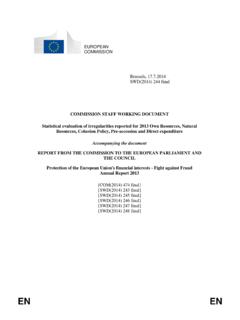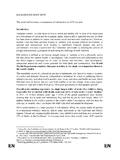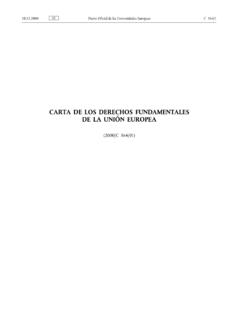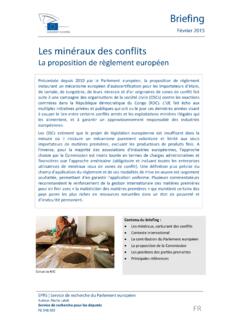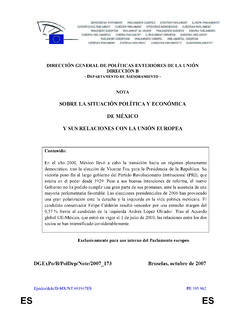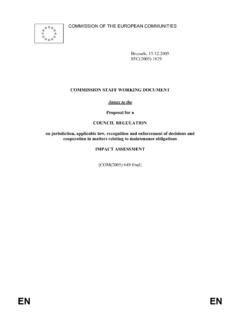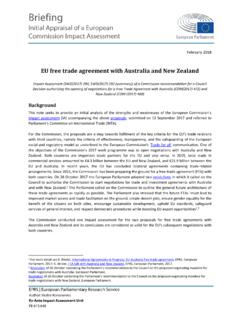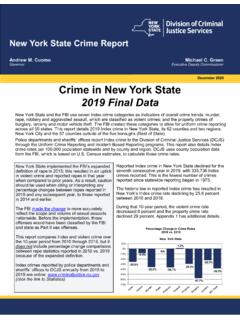Transcription of DIRECTORATE GENERAL FOR INTERNAL POLICIES
1 DIRECTORATE GENERAL FOR INTERNAL POLICIES POLICY DEPARTMENT C: CITIZENS RIGHTS AND CONSTITUTIONAL AFFAIRS CIVIL LIBERTIES, JUSTICE AND HOME AFFAIRS Legal Frameworks for Hacking by Law enforcement : Identification, Evaluation and Comparison of Practices STUDY Abstract This study, commissioned by the European Parliament s Policy Department for Citizens Rights and Constitutional Affairs at the request of the LIBE Committee, presents concrete policy proposals on the use of hacking techniques by law enforcement . These proposals are driven by a comparative examination of the legal frameworks for hacking by law enforcement across six EU Member States and three non-EU countries, in combination with analyses of the international and EU-level debates on the topic and the EU legal basis for intervention in the field. PE EN ABOUT THE PUBLICATION This research paper was requested by the European Parliament s Committee on Civil Liberties, Justice and Home Affairs and was commissioned, overseen and published by the Policy Department for Citizens Rights and Constitutional Affairs.
2 Policy Departments provide independent expertise, both in-house and externally, to support European Parliament committees and other parliamentary bodies in shaping legislation and exercising democratic scrutiny over EU external and INTERNAL POLICIES . To contact the Policy Department for Citizens Rights and Constitutional Affairs or to subscribe to its newsletter please write to: Research Administrator Responsible Kristiina MILT Policy Department C: Citizens Rights and Constitutional Affairs European Parliament B-1047 Brussels E-mail: AUTHORS Mirja GUTHEIL, Optimity Advisors Quentin LIGER, Optimity Advisors Aur lie HEETMAN, Optimity Advisors James EAGER, Optimity Advisors Max CRAWFORD, Optimity Advisors With the support of Professor Bert-Jaap KOOPS and Ivan SKORV NEK of the Tilburg Institute for Law, Technology, and Society (TILT) at Tilburg University; Carly NYST, independent expert; Gerben KLEIN BALTINK, Chairman of the Dutch Internet Standards Platform; and Professor Catherine CRUMP, Assistant Clinical Professor of Law and Acting Director of the Samuelson Law, Technology & Public Policy Clinic, University of California.
3 LINGUISTIC VERSIONS Original: EN Manuscript completed in March 2017 European Union, 2017 This document is available on the internet at: DISCLAIMER The opinions expressed in this document are the sole responsibility of the author and do not necessarily represent the official position of the European Parliament. Reproduction and translation for non-commercial purposes are authorised, provided the source is acknowledged and the publisher is given prior notice and sent a copy. Legal Frameworks for Hacking by Law enforcement _____ 3 CONTENTS Scope of the study 15 Study methodology 15 Structure of the report 17 Encryption as an investigative barrier 18 Fundamental rights considerations 21 Security of the internet and ICTs 25 Jurisdictional challenges 27 Regulation of hacking tools 30 Judicial cooperation in criminal matters 34 Privacy and data protection 36 Legal frameworks and context 41 Provisions of the legal framework 47 Fundamental rights considerations 54 Technical means used by law enforcement 58 Security and intelligence services: legal framework 61 France Country report 72 Germany Country report 77 Italy Country report 84 Netherlands Country report 90 Policy Department C.
4 Citizens Rights and Constitutional Affairs 4 Poland Country report 97 United Kingdom Country report 103 Australia Country report 111 Israel Country report 117 United States Country report 121 Legal Frameworks for Hacking by Law enforcement 5 LIST OF ABBREVIATIONS ABW INTERNAL Security Agency (Poland) ACLU American Civil Liberties Union AIVD GENERAL Intelligence & Security Service (the Netherlands) BKAG Federal Criminal Police Act (Germany) CALEA US Communications Assistance for Law enforcement Act 1994 CCIT Competence Centre for Information Technological Surveillance (Germany) CCPCJ UN Commission for Crime Prevention and Criminal Justice CoE Council of Europe DUCG Dual-Use Coordination Group EC3 European Cybercrime Centre Europol ECHR European Convention on Human Rights ECPA Electronic Communications Act (US) EDPS European Data Protection Supervisor EFF Electronic Frontier Foundation ENISA European Union Agency for Network and Information Security EWG Encryption Working Group (US) FBI Federal Bureau of Investigation (US) FRA European Union Agency for Fundamental Rights GDPR GENERAL Data Protection Regulation ICCPR International Covenant on Civil and Political Rights ICT Information and Communications Technology Policy Department C.
5 Citizens Rights and Constitutional Affairs 6 Interpol International Criminal Police Organisation IoT Internet of Things IP Internet Protocol IT Information Technology LIBE Committee European Parliament Committee on Civil Liberties, Justice and Home Affairs MIVD Military Intelligence & Security Service (the Netherlands) NCA National Crime Agency (UK) NDA Non-Disclosure Agreement NGO Non-Governmental Organisation NIT Network Investigative Technique NSA National Security Agency (US) SCA Stored Communications Act (US) STEG Surveillance Technology Expert Group StPO Code of Criminal Procedure (Germany) TEU Treaty on European Union TFEU Treaty on the Functioning of the European Union Tor The Onion Router UDHR Universal Declaration of Human Rights UN United Nations UNODC United Nations Office on Drugs and Crime VEP Vulnerability Equities Process VPN Virtual Private Networks ZITiS Central Office for Information in the Security Sphere (Germany) Legal Frameworks for Hacking by Law enforcement 7 LIST OF BOXES Box 1: Key recommendations from the UN GENERAL Assembly s 2016 resolution on the right to privacy in the digital age.
6 23 Box 2: National-level debates on fundamental rights. 24 Box 3: Examples of the use of hacking by law enforcement in the US and the jurisdictional challenges. 29 Box 4: Non-EU countries: Use of grey area legal provisions. 43 Box 5: Member State statements on encryption as an investigative barrier. 45 Box 6: Non-EU countries: Terrorism as a driver of hacking by law enforcement 46 Box 7: Conditions for the lawful restriction of the right to privacy. 47 Box 8: Select good practice elements of the legislative provisions for hacking by law enforcement . 58 Box 9: Profile of the Vault7 publication of reportedly CIA documents. 62 LIST OF FIGURES Figure 1: Countries to which FinFisher has been sold. 32 LIST OF TABLES Table 1: Rationale for selected EU Member States 16 Table 2: Current practices of cooperation between LEAs and service providers 27 Table 3: Specific legal provisions for law enforcement hacking in four Member States.
7 42 Table 4: Specific legislative proposals tabled in Italy and the Netherlands regarding hacking by law enforcement . 44 Table 5: Legal provisions for judicial authorisation of hacking by law enforcement 48 Table 6: Non-EU countries: Legal provisions for judicial authorisation of hacking by law enforcement 49 Table 7: Examples of ex-ante conditions for authorisation of hacking practices. 50 Table 8: Member State approaches to ex-post supervision and oversight of hacking by law enforcement . 53 Table 9: Selected criticisms of Member State legal provisions for the use of hacking techniques by law enforcement agencies. 56 Table 10: Additional legislative specificity regarding hacking techniques. 59 Table 11: Examples of in-house development of expertise and tools. 60 Table 12: Difference in capabilities between the security and intelligence services and law enforcement . 63 Table 13: Key findings on Member State legal frameworks for surveillance by FRA.
8 64 Table 14: Risks presented by law enforcement use of hacking techniques. 66 Table 15: Legal implementation of ECtHR minimum safeguards in Germany 81 Policy Department C: Citizens Rights and Constitutional Affairs 8 EXECUTIVE SUMMARY Hacking by law enforcement is a relatively new phenomenon within the framework of the longstanding public policy problem of balancing security and privacy. On the one hand, law enforcement agencies assert that the use of hacking techniques brings security, stating that it represents a part of the solution to the law enforcement challenge of encryption and Going Dark without systematically weakening encryption through the introduction of backdoors or similar techniques. On the other hand, civil society actors argue that hacking is extremely invasive and significantly restricts the fundamental right to privacy. Furthermore, the use of hacking practices pits security against cybersecurity, as the exploitation of cybersecurity vulnerabilities to provide law enforcement with access to certain data can have significant implications for the security of the internet.
9 Against this backdrop, the present study provides the LIBE Committee with relevant, actionable insight into the legal frameworks and practices for hacking by law enforcement . Firstly, the study examines the international and EU-level debates on the topic of hacking by law enforcement (Chapter 2), before analysing the possible legal bases for EU intervention in the field (Chapter 3). These chapters set the scene for the primary focus of the study: the comparative analysis of legal frameworks and practices for hacking by law enforcement across six selected Member States (France, Germany, Italy, the Netherlands, Poland and the UK), with further illustrative examples from three non-EU countries (Australia, Israel and the US) (Chapter 4). Based on these analyses, the study concludes (Chapter 5) and presents concrete recommendations and policy proposals for EU action in the field (Chapter 6). The international and EU-level debates on the use of hacking techniques by law enforcement primarily evolve from the law enforcement challenge posed by encryption the Going Dark issue.
10 Going Dark is a term used to describe [the] decreasing ability [of law enforcement agencies] to lawfully access and examine evidence at rest on devices and evidence in motion across communications networks .1 According to the International Association of Chiefs of Police (IACP), law enforcement agencies are not able to investigate illegal activity and prosecute criminals without this evidence. Encryption technologies are cited as one of the major barriers to this access. Although recent political statements from several countries (including France, Germany, the UK and the US) seemingly call for backdoors to encryption technologies, support for strong encryption at international and EU fora remains strong. As such, law enforcement agencies across the world started to use hacking techniques to bypass encryption. Although the term hacking is not used by law enforcement agencies, these practices essentially mirror the techniques used by hackers ( exploiting any possible vulnerabilities including technical, system and/or human vulnerabilities within an information technology (IT) system).
